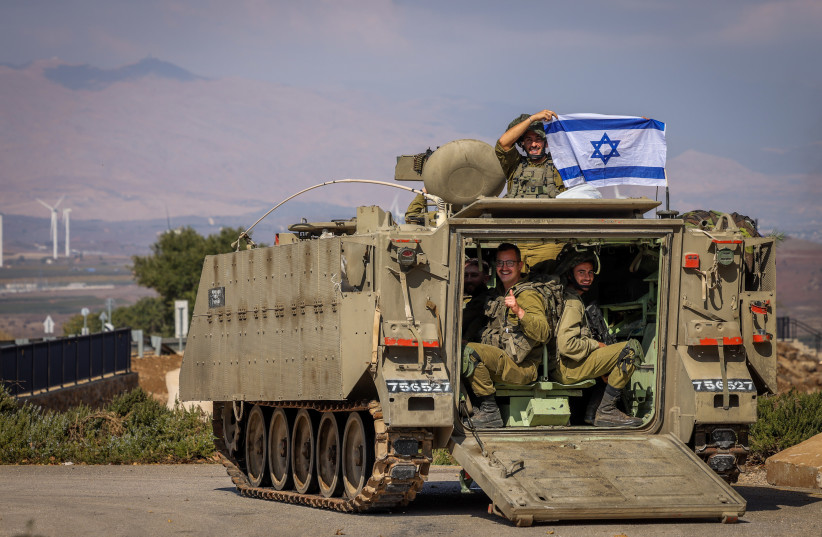For many, the events of the October 7 Black Shabbat and the atrocities committed by bloodthirsty Hamas killers evoked scenes and images from the Holocaust.
The unimaginable cruelty of murdering infants, women, and men for being Jews engendered comparisons between the Nazis and Hamas, and between the Holocaust and the massacre in Israel’s South. And that is a mistake.
The Hamas terrorists are certainly no less brutal than the Nazis, but we are, thank God, far from a second Holocaust.
While six million Jews were led to the slaughter without the ability to defend themselves, Israel is still a regional power – in pain but very much alive and vibrant. Despite the terrible blow of that Shabbat, Israel is fully mobilized and fiercely fighting back. My grandfather, Yehoshua, for whom I am named, was murdered in Bergen-Belsen. His burial place is, of course, unknown.
His yartzeit, the date of his death, is also based on third-hand testimony. Most of his family was killed in the Nazi camps, lost to the crematoria. So many family members were murdered that, despite efforts, we have been unable to recover all their names and memorialize them. For five years, the Nazis committed monstrous acts, murdering six million Jews in horrifying ways, and no one stopped them.

Residents of the South were not left defenseless
The war against the Third Reich was waged to prevent it from conquering the world, not to save the Jews.
The contemporary reality is different in every sense. Black Shabbat was a terrible blow, a day when more Jews were murdered than on any other day since that dark era. The evidence of mass slaughter and heinous atrocities recalled those days indeed. But this is where the imagination stops. True, due to the terrible failure of the entire system, no one foresaw this attack. But it has become increasingly clear since October 7 that the residents of the South were not left defenseless.
The first forces began to flow toward the South almost from the moment the attack began. Heroic soldiers and civilians, equipped with weapons, confronted the butchers and fought them courageously. The death toll is still not yet fully known, but the bravery of those fighters prevented the murderers from advancing further into Israel, as they had planned, to slaughter more Jews. This time it didn’t take five years of combat; it took just over five minutes.
The State of Israel bowed its head and mourned, but it also rose from the carnage to fight back.
The unflinching mobilization of citizens to come to the aid of their fellow citizens and the massive enlistment into the IDF, are testament to the Israeli will to stand up to the oppressor and fight back – a ray of hope lighting the darkness. Since that Black Sabbath, we have stood face forward to defend our homeland and have worked tirelessly to rescue the hostages from Gaza.
The victims of this period will be remembered and memorialized
Unlike what was impossible during and after the Holocaust, all will be accounted for and remembered. The staggering number of victims is shocking, but each of them has a face and a name.
The stories of their lives will be told, their memories preserved. The media and civil society organizations are working to gather information and make it accessible to the public. Family members will be able to tell the story of their loved ones, even in the midst of great loss, and ensure that the person who was murdered or fell in battle will never be forgotten.
Furthermore, the scale of the Holocaust was unprecedented in human history. There had never been anything like it. And we swore that there would never be anything like it again. This is how the Holocaust should be approached and remembered. Comparison, and the appropriation of Holocaust symbols to illustrate the magnitude of the current horror, is not helpful in contending with the here and now, and certainly not helpful in preserving the singularity of the Holocaust and how it is remembered.
Comparing the current disaster to the Holocaust is a mistake. It weakens us. Unlike then, our defense forces are strong, and we are fighting the Hamas oppressor with all our might.
It is true that antisemitism is on the rise throughout the world. And once again, rhetoric is heard that harkens back to very dark days. But here too, unlike then, we have a country that is a safe haven for Jews everywhere. Evoking the Holocaust in this context conflates present reality with an era of weakness and abject helplessness. Deploying the symbols of those days conveys the sense that they have returned. They have not.
The atrocities committed by Hamas speak for themselves. Aligning them with the Holocaust, and resigning oneself to the feeling that history is repeating itself, is not only inaccurate and inappropriate, but it also erodes the Israeli spirit and Israel’s image in the world. It is enough to assert that the October 7 massacres affirm our moral right to defend ourselves and prevent similar acts in the future, even without linking it to the Holocaust.
The Black Sabbath was terrible enough in its own right.
The writer is the vice president of the Jewish People Policy Institute and a lecturer in law at the Peres Academic Center.
